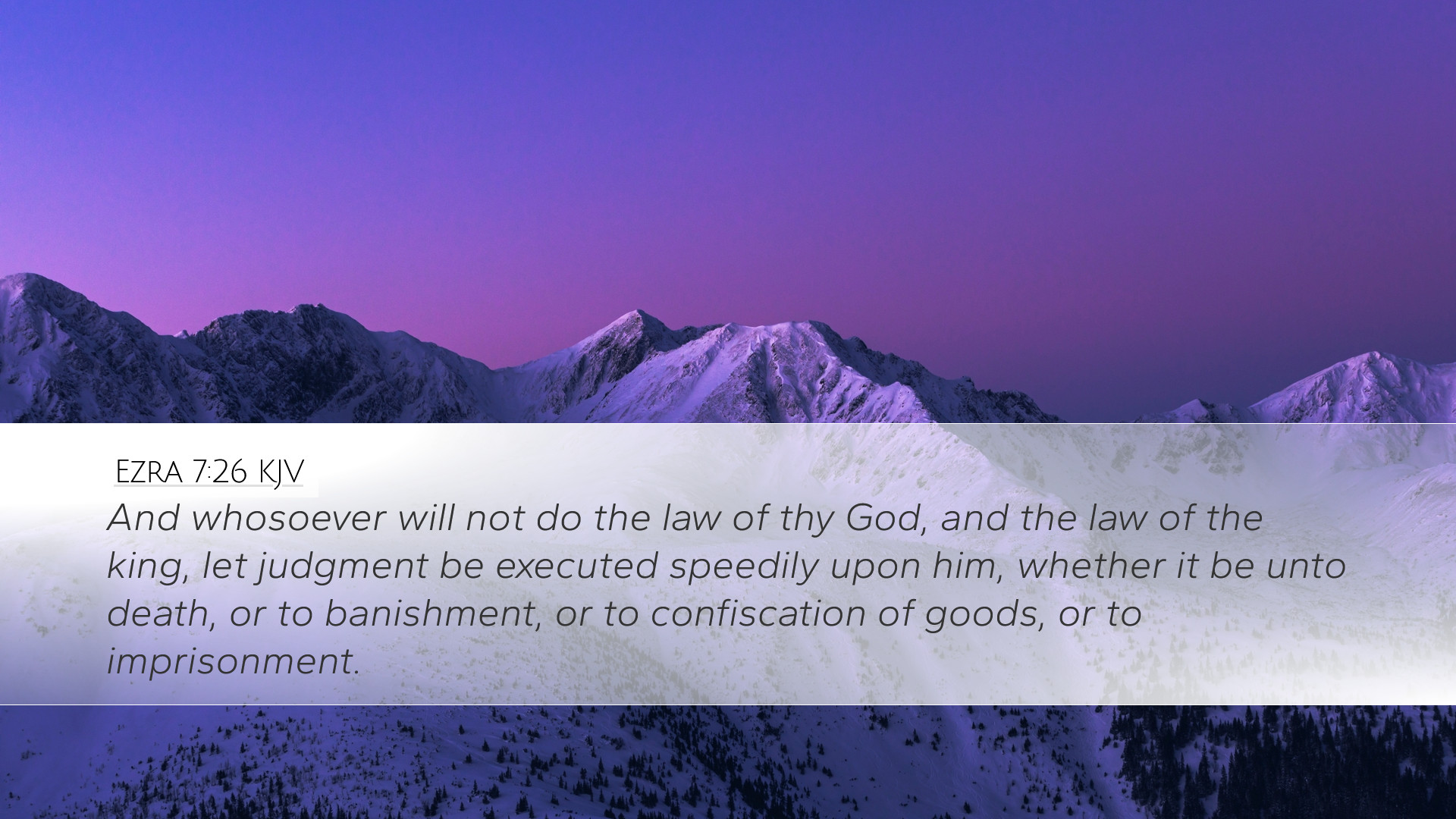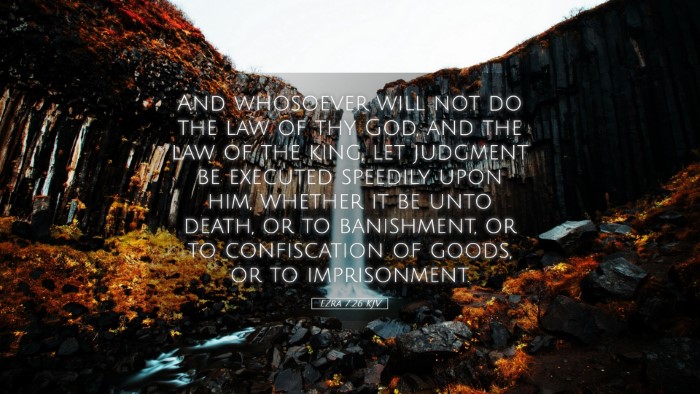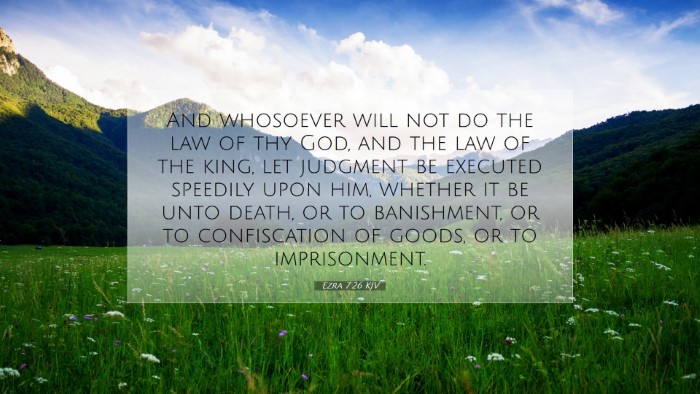Old Testament
Genesis Exodus Leviticus Numbers Deuteronomy Joshua Judges Ruth 1 Samuel 2 Samuel 1 Kings 2 Kings 1 Chronicles 2 Chronicles Ezra Nehemiah Esther Job Psalms Proverbs Ecclesiastes Song of Solomon Isaiah Jeremiah Lamentations Ezekiel Daniel Hosea Joel Amos Obadiah Jonah Micah Nahum Habakkuk Zephaniah Haggai Zechariah MalachiEzra 7:26
Ezra 7:26 KJV
And whosoever will not do the law of thy God, and the law of the king, let judgment be executed speedily upon him, whether it be unto death, or to banishment, or to confiscation of goods, or to imprisonment.
Ezra 7:26 Bible Commentary
Commentary on Ezra 7:26
Verse Context: Ezra 7:26 states, "And whosoever will not do the law of thy God, and the law of the king, let judgment be executed speedily upon him, whether it be unto death, or to banishment, or to confiscation of goods, or to imprisonment." This verse, set within the broader narrative of Ezra's return to Jerusalem, encapsulates the fusion of divine and civil authority in the governance of God's people.
Authority of Ezra
Matthew Henry Commentary: Ezra, having received authorization from Artaxerxes, is portrayed as a significant leader possessing spiritual authority. His role was not merely clerical but authoritative in enforcing the law of God within the community. His command underscores the gravity of adherence to both God’s law and civil law.
Albert Barnes Commentary: Ezra's authority is divinely sanctioned here, implying a direct link between obedience to God's law and societal order. Barnes emphasizes that adherence to God's law is crucial for maintaining both personal righteousness and communal harmony.
Adam Clarke Commentary: Clarke elaborates on Ezra's dual role as priest and scribe, suggesting that his commitment to scriptural law gives him the right to demand obedience from others. Clarke advocates that Ezra’s edict was meant to instill a divine reverence in the hearts of the people.
The Weight of Judgment
Consequences for Disobedience: The severe penalties outlined in this verse indicate an understanding that disobedience leads to societal decay. The options of death, banishment, confiscation of goods, or imprisonment reflect a comprehensive approach to maintaining order and ensuring community compliance.
Matthew Henry's Insights: Henry draws attention to the immediacy of the judgment. It wasn’t merely a suggestion, but a mandate that required swift action. He implies that such strict measures were necessary to maintain covenant fidelity in a society that had been plagued by sin and apostasy.
Albert Barnes Reflection: Barnes stresses that the threats of punishment serve as a deterrent against moral decay. He points out that this reflects the seriousness with which the Israelites viewed their covenant with God and their social responsibilities.
Adam Clarke's Interpretation: Clarke sees the swift execution of judgment as an affirmation of divine order. He suggests that this strong stance reflects not only the weight of the Mosaic law but also the need for societal structure under God’s guiding principles.
Integration of Divine Law and Civil Law
The Significance of Dual Law: The intertwining of divine and civil law in Ezra 7:26 speaks to a holistic understanding of governance among the Israelites. The command implies that the people are to regard both laws with equal commitment, recognizing God’s sovereignty over all aspects of life.
Matthew Henry's Commentary: Henry emphasizes this integration, highlighting that the acknowledgment of God’s law as paramount does not negate the need for civil obedience but rather enhances the moral framework within which the society operates.
Albert Barnes' Insight: Barnes notes that this integration serves to elevate the governing authority, while simultaneously reminding leaders—and the people—of their accountability to God. He reflects on how such an approach lays a foundation for justice and equity in the community.
Adam Clarke's Perspective: Clarke underscores that the dual responsibility both liberates and binds the community. The people are compelled not only by fear of punishment but by a sense of divine calling to live in accordance with the principles of God's word.
Applications and Implications for Today's Believers
Contemporary Relevance: The principles derived from Ezra 7:26 extend beyond the historical context, offering crucial insights for today's church and society. The tension between civil authority and divine command is still present, activating a need for believers to advocate for justice and righteousness.
Emphasis on Obedience: Modern-day Christians are called to a deep-rooted obedience that encompasses all aspects of life—spiritual, moral, and civic. The necessity of submitting to both God’s law and earthly authorities, as implied in this passage, challenges believers to navigate complex ethical decisions in a pluralistic society.
Importance of Community: Ezra's decree serves as a reminder of the communal aspect of faith. In today’s context, believers must support one another in upholding God’s standards, ensuring that the community collectively fosters an atmosphere of righteousness.
The Call for Strong Leadership: The role of spiritual leaders today mirrors that of Ezra. Leadership entails calling the community to accountability, encouraging adherence to divine principles while also advocating for moral integrity within civil governance.
Conclusion
Ezra 7:26 stands as a significant testament to the necessity of combining divine mandates with civil responsibilities. Through the insights of notable commentators, we see a rich tapestry of interpretation that echoes throughout time. The dual commands to uphold God’s law and the law of the king remind us of our perpetual duty in both heavenly and earthly realms. As we reflect on this passage, may we foster a commitment to live righteously, both individually and collectively, under the sovereign rule of God.


